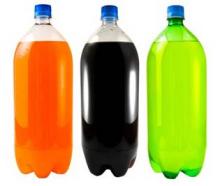SAN ANTONIO – Sugar-sweetened beverages may take a bigger toll on those genetically predisposed to obesity, according to an analysis of data from the Nurses’ Health Study and the Health Professionals Follow-up Study.
In a combined cohort of 6,934 women and 4,423 men from those prospective longitudinal studies, intake of sugar-sweetened beverages had an impact on a genetic-predisposition score for adiposity. The score was calculated based on single nucleotide polymorphisms representing 32 loci that have an established association with body mass index.
The increases in BMI per increment of 10 risk alleles were 1.00 for those who drank less than one serving of sugar-sweetened beverages per month, 1.20 for those who drank 1-4 servings, and 1.37 for those who drank 4-6 servings. For those who drank one or more servings each day, the risk was 1.85, Dr. Lu Qi reported at the annual meeting of the Obesity Society.
The relative risks of incident obesity per increment of 10 risk alleles were 1.19, 1.67, 1.58, and 5.06 for those same intake categories, respectively, said Dr. Qi of the Harvard School of Public Health, Boston.
Similar findings were seen in a replication cohort of 21,740 women in the Women’s Genome Health Study, another prospective longitudinal cohort study of initially healthy women. The increases in BMI per increment of 10 risk alleles in this cohort were 1.39, 1.64, 1.90, and 2.53 for the four categories of intake, respectively, and the relative risks for incident obesity were 1.40, 1.50, 1.16, 1.54, and 3.16, respectively.
"In all three cohorts, the combined genetic effects on BMI and obesity risk among persons consuming one or more servings of sugar-sweetened beverages per day were approximately twice as large as those among persons consuming less than one serving per month. These data suggest that persons with greater consumption of sugar-sweetened beverages may be more susceptible to genetic effects on adiposity. Viewed differently, persons with a greater genetic predisposition to obesity appeared to be more susceptible to the deleterious effects of sugar-sweetened beverages on BMI," according to Dr. Qi and his colleagues.
The presentation of the findings coincided with their publication online (N. Engl. J. Med. 2012 Sept. 21 [doi: 10.1056/NEJMoa1203039]).
The consumption of sugar-sweetened beverages has increased dramatically over the past three decades, as has the prevalence of obesity.
One strength of this study is the use of the genetic-predisposition score comprised of multiple genetic variants.
Dr. Qi said that sugar-sweetened beverages have high calorie content but are associated with low satiety and incomplete compensation for the liquid-calorie increases in total energy intake. Also, the large amount of rapidly absorbable carbohydrates in these beverages may increase risk of insulin resistance, beta-cell dysfunction, inflammation, visceral adiposity, and other metabolic disorders.
Future studies are needed to clarify the underlying mechanisms of the interaction between the intake of sugar-sweetened beverages and a genetic predisposition to elevated adiposity or obesity, as the biologic functions of most established BMI-associated loci remain largely unknown.
The findings nonetheless underscore the need to test interventions that may reduce the intake of sugar-sweetened beverages as a means for reducing obesity risk and for preventing related diseases, Dr. Qi said.
This study was supported by the National Institutes of Health, Merck Research Laboratories, the American Heart Association Scientist, and the Harvard Glaucoma Center of Excellence. Dr. Qi reported receiving lecture fees from Kellogg. Complete author disclosures are available with the full text of the article at www.NEJM.org.


